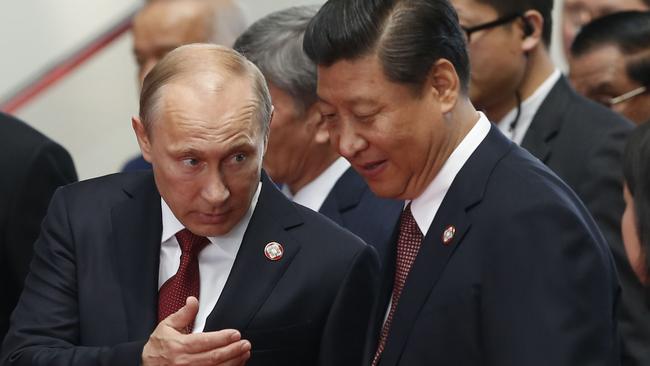Putin befriends lonely Middle Kingdom
THE handshake in Shanghai between Vladimir Putin and Xi Jinping this week revisited the days of a former approach to diplomacy.

Russia has crowbarred Crimea off from Ukraine and is looking to lever away more territory there.
The Europeans are cross. But not so as to do much about it. The inept US Secretary of State John Kerry reiterates final warnings that he’s at the end of his tether.
So, not much cause for concern there on Putin’s part. But still, he can’t anticipate selling Europe a lot more energy products or resources than Russia has already been contracted to supply. And Russia these days is a petro-state with an auxiliary defence technology engine — with large volumes of gas stuck in eastern Siberia looking for an outlet.
The answer, then, for reasons both of pragmatic economic realism and of diplomatic loneliness, is to pal up with China.
China has never perceived Russia as a natural ally. Relations between its Communist Party and that of the old Soviet Union were in turn intimate, respectful, awkward and downright hostile — the latter leading directly to the detente between Mao Zedong and Richard Nixon.
But China itself, characterised by Beijing professor Zhu Feng as “a lonely rising power”, is also today finding itself beleaguered internationally.
This week Washington charged five People’s Liberation Army officers with cyberhacking. The push-back by Vietnam against Chinese claims in Paracel islands it also claims turned ugly, striking a blow at Chinese economic interests in Vietnam.
On his recent visit to Asia, Barack Obama pledged US support for Japan if China seizes the Senkaku/Diaoyu islands that Tokyo controls, and signed a deal sought by The Philippines to strengthen their defence alliance in the face of Chinese claims in the Spratly islands. And now, at the end of the week, China is reeling from the latest of a series of terrorist attacks, killing 31 in Urumqi, the capital of Xinjiang.
Insofar as Beijing — whose history education focuses on China being victimised by foreign powers — feels genuinely concerned about being isolated and “contained”, it too seeks some international solidarity.
And, to a degree, Russia fits the bill. It too is suffering from what it views as the moral vanity and emptiness of the West. It too is determined to respond firmly to Islamist and separatist violence. It too is determined to maintain a governance route viewed by Westerners as undemocratic.
China’s Global Times editorialised this week: “The US is such a mincing rascal that we must stop developing any illusions about it.”
So a decade of painstaking negotiations has been hurriedly closed, with the signing in Shanghai by Putin and Xi of a $430 billion, 30-year gas deal starting in 2018.
This is a huge deal, but Russia is still committed to supplying more than four times this volume of gas to Europe. And China’s trade with the US remains three times more than with Russia.
The cosying-up between Putin and Xi does not comprise a Cold War re-run. Our times are more flexible. China especially, but Russia also, benefit massively from global economic engagement, which strategic alignments don’t necessarily trump.
China is the favoured assembly point of the products of a vast array of value chains that involve many other Asian economies. Dismantling this structure for alleged security reasons would cost China especially dearly.
Not that Beijing’s new leadership has even remotely hinted at diminishing its international economic engagement.
The heightened state of strategic tension in our region is part of a more complex picture — with countries such as Japan, Indonesia, India, South Korea, Vietnam, The Philippines and Singapore developing autonomous capacities and plans in which the US will figure prominently but not as a queen surrounded by pawns.
But while the China-Russia axis will not decisively rule the Asian landmass, it will not fall apart easily while these leaders remain in power. They already edgily work together through the Shanghai Co-operation Organisation covering Central Asia — though China has become the kingpin there, with Russia, the former coloniser, viewed both nostalgically and suspiciously.
And Xi has this week channelled Kevin Rudd in urging “a new regional security architecture” for Asia — where the present structures involve the US, either via an ASEAN hub, or in the six-party talks intended to bring North Korea in from the cold. In this round of diplomatic musical chairs, the music — the coups, the military forays, the Snowden thefts, the collisions in contested waters — keeps coming, and the outcomes remain fluid.




THE handshake in Shanghai between Vladimir Putin and Xi Jinping this week revisited the days of diplomacy when world powers made brave plays, deployed cunning feints, and forged fresh alliances to counter rivals.